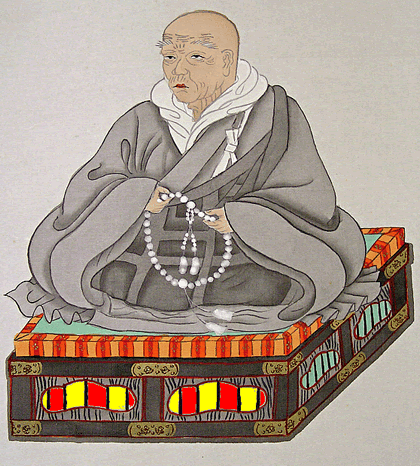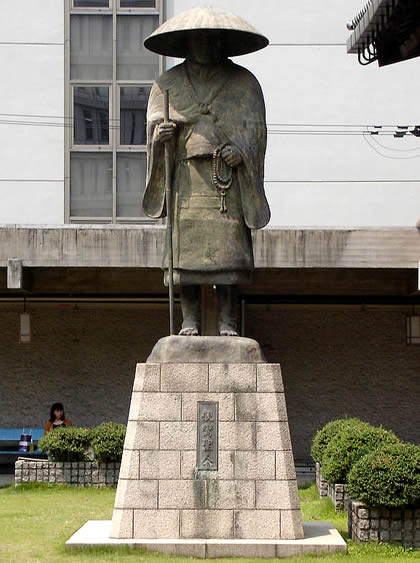World History
Shinran was a Japanese Buddhist philosopher who was primarily concerned with the fate of the mass of the people who would be unable to achieve enlightenment through their own efforts.
He emphasized the role of faith as a means of salvation and placed it in the context of action and attainment of enlightenment. His school of Buddhism was called the Jodo Shinsu (the True Pure Land), and it has become one of the largest such schools in modern Japan.
Shinran became a monk at childhood after the deaths of his parents and he studied at the Tendai school on Mount Hiei. He underwent a process of asceticism in the search for enlightenment but failed to achieve his goal in this way.
Granted a short sabbatical in the Rokkaku-do (Hexagonal Temple in Kyoto), he encountered Honen and was inspired to follow his Pure Land Buddhist form of belief, which held that calling out the name of the Buddha in true faith would be sufficient for people to achieve enlightenment in the practice known as nembutsu. Shinran abandoned his previous asceticism and became an advocate of nembutsu. When this was outlawed in 1209, he was exiled.
He subsequently married, despite the requirement for monks to remain celibate. His son, Zenran, followed him into the religious life but this led to conflict later when Shinran felt compelled to disown Zenran on the basis of the young man’s different (and hence heretical) religious beliefs.
Shinran spent around 20 years in Kanto after his exile, where he continued his studies, wrote extensive tracts, and attempted to convert the local people.
After the Kanto years, Shinran returned to Kyoto, where he then had a confrontation with his son, who had been leading followers in the absence of his father. Shinran died in Kyoto at the age of 90. His followers commemorated his life, in part with the creation of an organized form of his religious beliefs.
True Pure Land Buddhism focuses on the worship of Amitabha Buddha and anticipation of paradise lands to the west, where those saved by their worship will make their perpetual home.
Worshipping the Buddha as an individual is contrary to the Buddha’s own intention, since he considered that he had successfully eradicated his own ego and, therefore, there was nothing left to worship. Further the Buddha stressed the need for all people to search for and evaluate all stages on the road to enlightenment individually and systematically.
True Pure Land Buddhism, therefore, was far more democratic than the Buddhism of the Buddha himself and offered happiness in the next world to a much larger group of people. It could be used, therefore, as a powerful force for modernization and social reform.
- Borobudur
Borobudur Borobudur, the largest Buddhist monument in the world, is located in central Java. Surrounded by fertile rice fields and coconut plantations, the Buddhist stupa is located on a small hill above Kedu Plain. It was built in 760 to resemble a mountain...
- Nalanda
Nalanda ruins Nalanda was the most renowned center of Buddhist learning in India in the fourth–12th centuries. A Buddhist monastic center and major university were located at Nalanda, which is in Baragaon, Bihar state, in east central India, about...
- Nara
Nara - Todai temple Nara is a city and prefecture in central, inland Japan that acted as the capital between 710 and 784. Prior to the Nara period, the capital of Japan was moved from city to city at the behest of an incoming emperor. However the accession...
- Nicheren - Religious Leader
Nicheren - Religious Leader Nicheren (or Nichiren) Buddhism was a sect unique to Japan that challenged the existing notions of Buddhism as part of a societywide upheaval of intellectual and religious understanding. The essence of Nicheren Buddhism is...
- Zen (ch’an) Buddhism
Zen (Ch’an) BuddhismZen is a form of Buddhism that concentrates on calm, reflective forms of meditation in the quest for enlightenment. The word Zen, by which the school is known in Japan, derives from the Sanskrit word dhyana, which means “meditation.â€...
World History
Shinran - Buddhist Philospher
 |
| Shinran - Buddhist Philospher |
Shinran was a Japanese Buddhist philosopher who was primarily concerned with the fate of the mass of the people who would be unable to achieve enlightenment through their own efforts.
He emphasized the role of faith as a means of salvation and placed it in the context of action and attainment of enlightenment. His school of Buddhism was called the Jodo Shinsu (the True Pure Land), and it has become one of the largest such schools in modern Japan.
Shinran became a monk at childhood after the deaths of his parents and he studied at the Tendai school on Mount Hiei. He underwent a process of asceticism in the search for enlightenment but failed to achieve his goal in this way.
  |   |
Granted a short sabbatical in the Rokkaku-do (Hexagonal Temple in Kyoto), he encountered Honen and was inspired to follow his Pure Land Buddhist form of belief, which held that calling out the name of the Buddha in true faith would be sufficient for people to achieve enlightenment in the practice known as nembutsu. Shinran abandoned his previous asceticism and became an advocate of nembutsu. When this was outlawed in 1209, he was exiled.
He subsequently married, despite the requirement for monks to remain celibate. His son, Zenran, followed him into the religious life but this led to conflict later when Shinran felt compelled to disown Zenran on the basis of the young man’s different (and hence heretical) religious beliefs.
Shinran spent around 20 years in Kanto after his exile, where he continued his studies, wrote extensive tracts, and attempted to convert the local people.
 |
| Shinran statue |
After the Kanto years, Shinran returned to Kyoto, where he then had a confrontation with his son, who had been leading followers in the absence of his father. Shinran died in Kyoto at the age of 90. His followers commemorated his life, in part with the creation of an organized form of his religious beliefs.
True Pure Land Buddhism focuses on the worship of Amitabha Buddha and anticipation of paradise lands to the west, where those saved by their worship will make their perpetual home.
Worshipping the Buddha as an individual is contrary to the Buddha’s own intention, since he considered that he had successfully eradicated his own ego and, therefore, there was nothing left to worship. Further the Buddha stressed the need for all people to search for and evaluate all stages on the road to enlightenment individually and systematically.
True Pure Land Buddhism, therefore, was far more democratic than the Buddhism of the Buddha himself and offered happiness in the next world to a much larger group of people. It could be used, therefore, as a powerful force for modernization and social reform.
- Borobudur
Borobudur Borobudur, the largest Buddhist monument in the world, is located in central Java. Surrounded by fertile rice fields and coconut plantations, the Buddhist stupa is located on a small hill above Kedu Plain. It was built in 760 to resemble a mountain...
- Nalanda
Nalanda ruins Nalanda was the most renowned center of Buddhist learning in India in the fourth–12th centuries. A Buddhist monastic center and major university were located at Nalanda, which is in Baragaon, Bihar state, in east central India, about...
- Nara
Nara - Todai temple Nara is a city and prefecture in central, inland Japan that acted as the capital between 710 and 784. Prior to the Nara period, the capital of Japan was moved from city to city at the behest of an incoming emperor. However the accession...
- Nicheren - Religious Leader
Nicheren - Religious Leader Nicheren (or Nichiren) Buddhism was a sect unique to Japan that challenged the existing notions of Buddhism as part of a societywide upheaval of intellectual and religious understanding. The essence of Nicheren Buddhism is...
- Zen (ch’an) Buddhism
Zen (Ch’an) BuddhismZen is a form of Buddhism that concentrates on calm, reflective forms of meditation in the quest for enlightenment. The word Zen, by which the school is known in Japan, derives from the Sanskrit word dhyana, which means “meditation.â€...
